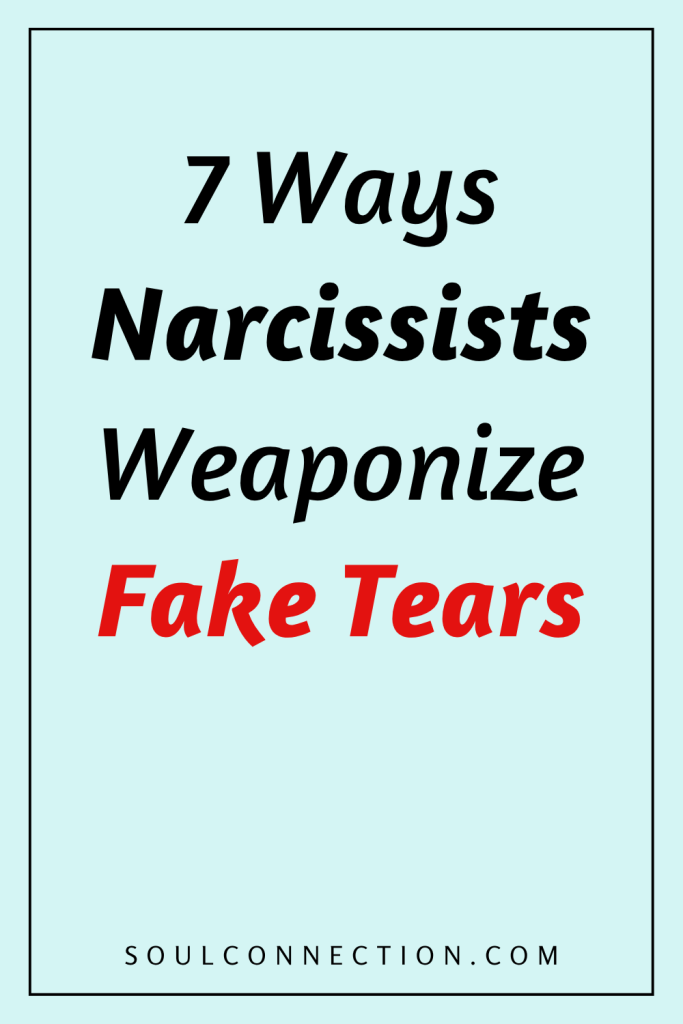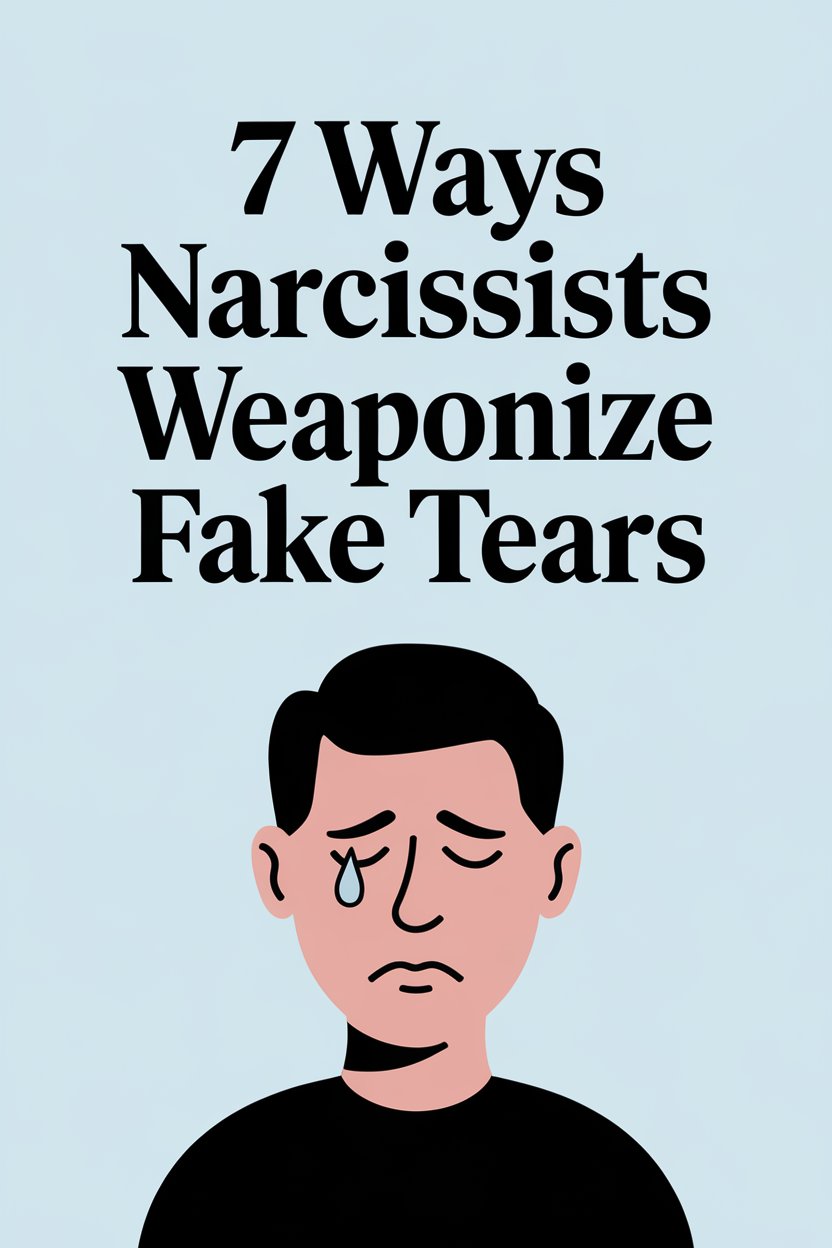Crocodile tears: nature’s way of reminding us that not all puddles are safe to step in. If you’ve ever been on the receiving end of a narcissist’s sob fest, you know just how bewildering it can be.
One minute they’re launching verbal grenades, the next they’re weeping like they’ve just watched the end of The Notebook on repeat. It’s not an Oscar-worthy performance—it’s tactical.
Pull up a chair (and maybe a rain poncho); it’s time to suss out exactly how narcissists use fake tears as their not-so-secret superpower.
1. The Artful Dodge Cry
Nothing says “I don’t want to answer for my actions” quite like a sudden burst of tears. Narcissists have perfected this move. Called out for a lie? Tears. Confronted about a broken promise? Sobs.
The emotional floodgates open, and suddenly the conversation is about their distress—not what actually happened.
This clever sleight of hand redirects attention away from the issue at hand. What could have been a healthy discussion about boundaries turns into a therapy session for their ‘wounded’ soul.
It’s psychological dodgeball—except you’re the only one playing by the rules.
If you notice a pattern of weeping whenever accountability is in the air, take a mental step back. Don’t abandon your point just because the waterworks started. Offer a tissue, but keep the conversation on track.
2. Sympathy Siphoning
Tears are powerful. They tug at heartstrings and flip switches in our brains that scream, “Protect!” Narcissists wield this human instinct with all the subtlety of a sledgehammer.
They cry not because they’re hurting, but because they want your sympathy poured out like syrup on a pancake.
This sympathy isn’t just an ego boost; it’s currency. With enough emotional capital, they’ll manipulate you into forgiving their worst behavior—or even apologizing for things you didn’t do.
Suddenly, you’re the villain, and they’re the poor, misunderstood soul.
Guard your empathy like you guard your phone on a crowded train. Compassion fatigue is real. Offer support without handing over the keys to your emotional vault.
3. Guilt Trip Express
Few things move faster than the guilt trip train when a narcissist is at the wheel. The tears start flowing, and suddenly you’re cast as the heartless monster who “made” them cry.
It’s not about resolving conflict or understanding each other—it’s about making you feel so terrible that you’ll do anything to stop the sobbing.
Never mind what you wanted to talk about. Now, it’s your job to patch up their feelings, ignore your own, and promise never to bring up such hurtful truths again.
Next time guilt comes gift-wrapped in tears, ask yourself: Are these feelings genuinely about the situation, or is this a shortcut to getting me to back down? Sometimes the kindest thing you can do—for both of you—is hold the line, kindly.
4. Rewriting History With Wet Eyes
Memory gets a creative upgrade when narcissists cry. Suddenly, they’re the victim in every story.
Arguments you remember as frustrating and one-sided are retold with them as the wounded protagonist, shedding heroic tears against your alleged cruelty.
This isn’t just inconvenient; it’s gaslighting on a glossier setting. When their tears rewrite events, the truth gets blurry. Self-doubt creeps in.
Maybe you were too harsh? Did you really say it like that? You start to question your own reality, and that’s exactly the point.
Anchor yourself in the facts. Keep a journal if you have to. Your memory is perfectly valid, even if it never includes an impromptu rainstorm.
5. Stage-Managed Outbursts for Maximum Audience
Private waterworks are one thing, but nothing beats a well-timed public sobbing session for a narcissist hoping to rally the troops. Suddenly, they’re dabbing at their eyes in front of friends, family, or co-workers.
The performance has a clear goal: make you look like a villain and them the tragic hero.
The more spectators, the better. Now you’re not just defending yourself to one person—you’re up against a chorus of confused and sympathetic bystanders wondering what you did to make them cry.
Public perception shifts, and you’re left holding the bag.
This can be isolating, but it’s important to remember who knows the real story. Don’t scramble to defend yourself to everyone. Focus on your truth, not the crowd-pleasing narrative.
6. Emotional Blackmail Wrapped in Tissue
Somehow, every teardrop comes with a price tag. Narcissists are experts at attaching conditions to their sorrow: “If you really loved me, you wouldn’t make me feel this way.”
It’s an emotional ransom that only ends when you pay up—by giving in, apologizing, or shelving your own needs.
This is manipulation, pure and simple. It’s not about vulnerability or connection; it’s about control. The tears are just a delivery system.
Countering emotional blackmail means recognizing the tactic for what it is. Set clear boundaries, and don’t let guilt steer you off course. Genuine relationships aren’t built on emotional ultimatums.
7. The Preemptive Pity Party
Ever tried to express a need or a concern, only to find yourself steamrolled by a fresh round of tears before you’ve even finished your sentence? Narcissists often deploy tears as a preemptive strike.
The message: “Don’t even think about bringing up your needs, because look how hurt I already am!”
This makes expressing yourself feel selfish, even when you’re simply asking for basic respect. Suddenly, you’re comforting them instead of advocating for yourself.
Break this cycle by calmly stating your needs, tears or no tears. It might feel awkward, but you deserve to have your feelings heard—without competing with a flood.
Weathering the Emotional Monsoon
Spotting fake tears is half the battle. The other half? Reclaiming your right to your own feelings, needs, and boundaries.
Narcissists might be skilled at stage-managing their emotions, but you don’t have to play a supporting role in their drama.
If you’re feeling whiplash from the emotional ups and downs, seek out a trusted friend, therapist, or support group—someone who believes you when you say, “I think those weren’t real tears.”
Remember: empathy is a strength, not a weakness. Just don’t let anyone use it as a leash.
And if all else fails, keep a metaphorical umbrella handy for the next sudden downpour. Your sanity will thank you.


